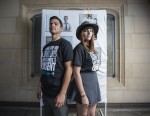Janelle Cohen’s early sexual harassment education in grade school featured pictures of girls crying and big red letters sensationalizing the threat and effects of sexual assault.
Cohen, who said she is a sexual assault ally, did not respond positively to these messages. To combat the stereotypical images of sexual assault, the third-year theater student decided to model for a series of pictures for a campus art gallery that aims to add a more personal touch to the traditionally taboo subject.
She and other students collaborated with 7,000 in Solidarity, an Undergraduate Students Association Council campaign against sexual assault and harassment at UCLA, to launch #AlcoholIsNotConsent – a week-long mobile art gallery.
The photography series aims to highlight the relationship alcohol shares with sexual assault and harassment, said Savannah Badalich, USAC Student Wellness commissioner and campaign manager of 7,000 in Solidarity.
Badalich said alcohol, more so than clothing and sexual history, is used by the criminal justice system to invalidate a survivor.
The mobile art gallery traveled from the North Campus greenery of Dickson Plaza, to the congested area around the Bruin Bear and into the concrete plaza of the Court of Sciences throughout the week. Badalich said she hopes the moveable nature of the photography series made the art more accessible to different types of students.
The photos in the series showcase both male and female UCLA students and alumni who have been impacted by sexual assault. Some of the models are survivors of sexual assault, others are allies.
BuzzFeed, an online news outlet, picked up the series to feature on its site on Tuesday after Badalich contacted the website earlier in the week.
Cohen said she heard Badalich, her roommate, planning the event and wanted to get involved. She said she wanted to model for the campaign because she thinks alcohol-related sexual assaults are one of the most important issues facing college-aged students.
In 2012, there were 22 total reported accounts of forcible sexual offenses, including rape, sexual assault with an object and forced fondling at or near UCLA, according to the 2012 Jeanne Clery report, an annual crime report published by UCPD. Fifteen incidents occurred on campus-owned property, six on university-affiliated property off campus and one in a publicly owned area.
The National Institute on Alcohol Abuse and Alcoholism found that more than 97,000 students between the ages of 18 and 24 are victims of sexual assaults involving alcohol every year, according to its website.
Several photos feature a single individual, face turned away from the camera, with multiple bottles of liquor littering the floor. Others show pairs or groups of students, clutching bottles in their hands or pushing them toward the lips of another. Almost every photo shared cuts off each model’s face, leaving him or her anonymous.
“Some (survivors of sexual assault) are not comfortable putting their face forward and saying, ‘This happened to me, and let me show you,'” Cohen said.
Milo Hemken, a fourth-year sociology student, was the only model to show his face in any of the photos. He said he chose to show his face to help connect the audience with his message that men should also be allies.
The wide variety of subjects in the photos captures the modern-day shifts between what defines men and women, masculinity and femininity, Cohen said.
Badalich said every photo contains a quote developed in conjunction with the featured models and stated by survivors.
Faizan Ghori, who photographed the models for the gallery, said he did not know the campaign centered around alcohol and sexual assault when campaign leaders reached out to him.
“It was the first time I had ever heard people speaking so freely about such a strong moment in their lives,” the fourth-year Middle Eastern and North African studies student and former Daily Bruin A&E; writer and photographer said.
He said while he first felt awkward after hearing the models’ frank talk about alcohol and consent, he thought the models’ attitudes about their experiences were both raw and powerful.
“They spoke about their assaults in a way that didn’t define them,” Ghori said.
Cohen said she hopes the photography series personally connects to students and puts a face to the reality of sexual assault on college campuses.
“I hope people take the time to read it and understand what the images are trying to say,” Cohen said.
The mobile art gallery will end Friday at Bruin Plaza on the patio in front Kerckhoff Hall.
